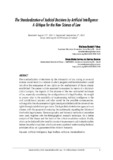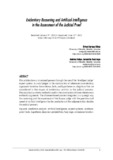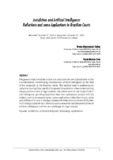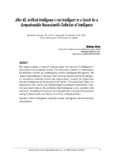The Standardization of Judicial Decisions by Artificial Intelligence: A Critique for the New Science of Law
La estandarización de las decisiones judiciales hecha por inteligencia artificial: una crítica para la nueva ciencia del derecho;
A padronização das decisões judiciais feita pela inteligência artificial: uma crítica para a nova ciência do direito
Compartir este ítem
Fecha
2022-12-20Autor
Boniatti, Matheus
Mello Correa de Barros, Bruno
Citación
Metadatos
Mostrar el registro completo del ítemDocumentos PDF
Resumen
The standardization of decisions by the informatics of law, aiming at an exact science would result in a science in which progress and transformations would not drive the emergence of new rights or the readjustment of those already established. The present article proposed to examine, by means of a doctrinal-critical analysis, the impacts of the advance of the new automated technique of law, especially considering the configurations of a legal Fordism. We sought to answer what is the possibility of implementing Artificial Intelligence in the civil jurisdictional process and what would be the possible consequences, with regard to the advancement of rights already established and the advent of new rights through jurisdictional provision. The hypothetical-deductive approach was chosen, with the purpose of analyzing the problematic regarding the failures of the Fordist legal science. The monographic and historical methods of procedure were used, together with the bibliographical research technique, for a better analysis of the theme and the basis of the critical-conclusive analysis. Finally, what can be deduced is the need for constant improvement and in-depth studies before the artificial machine, which is not even capable of understanding the basic principles of law as a guarantee of the citizen s humanity. La estandarización de las decisiones por parte de la informática del derecho, apuntando a una ciencia exacta, resultaría en una ciencia en la que el progreso y las transformaciones no impulsarían el surgimiento de nuevos derechos o el reajuste de los ya establecidos. El presente artículo se propuso examinar, mediante un análisis doctrinal-crítico, los impactos del avance de la nueva técnica automatizada del derecho, especialmente considerando las configuraciones de un fordismo jurídico. Se buscó responder cuál es la posibilidad de implementar la Inteligencia Artificial en el proceso jurisdiccional civil y cuáles serían las posibles consecuencias, en relación con el avance de los derechos ya establecidos y el advenimiento de nuevos derechos a través de la prestación jurisdiccional. Se ha optado por el enfoque hipotético-deductivo, con el fin de analizar la problemática relativa a los fracasos de la ciencia jurídica fordista. Se utilizaron los métodos de procedimiento monográfico e histórico, junto con la técnica de investigación bibliográfica, para un mejor análisis del tema y la base del análisis crítico-conclusivo. Finalmente, lo que se deduce es la necesidad de perfeccionamiento y profundización constante ante la máquina artificial, que ni siquiera es capaz de entender los principios básicos del derecho como garantía de la humanidad del ciudadano. A padronização das decisões por parte da informática do direito, visando uma ciência exata, resultaria em uma ciência em que o progresso e as transformações não impulsariam o aparecimento de novos direitos ou o reajuste dos já estabelecidos. O presente artigo se propôs examinar, através de uma análise doutrinal-crítico, os impactos do avanço da nova técnica automatizada do direito, especialmente considerando as configurações de um fordismo jurídico. Procurou-se responder qual é a possibilidade de aplicar a inteligência artificial no processo jurisdicional civil e quais seriam as possíveis consequências, em relação com o avanço dos direitos já estabelecidos e o aparecimento de novos direitos através da prestação jurisdicional. Foi escolhida como metodologia procedimento monográfico e histórico, junto com a técnica de investigação bibliográfica, para uma melhor análise do tema e análise da base crítico-conclusiva. Finalmente o que se deduz é a necessidade de aperfeiçoamento e ampliação constante face a máquina artificial, que nem sequer é capaz de entender os princípios básicos do direito como garantia da humanidade do cidadão.
Colecciones
Excepto si se señala otra cosa, la licencia del ítem se describe como Attribution-NonCommercial-ShareAlike 4.0 International
Ítems relacionados
Mostrando ítems relacionados por Título, Autor o Palabra clave.
-
Evidentiary Reasoning and Artificial Intelligence in the Assessment of the Judicial Proof
Vargas, Orión; Jaramillo Restrepo, Andrés Felipe (MedellínUniversidad de MedellínFacultad de Derecho, 2022-12-06)This article shows a structured process through the use of the Intelligent Judge expert system, to assist judges in the construction of inferences or evidentiary arguments based on the evidence, facts, and hypotheses or ... -
Jurisdiction and Artificial Intelligence: Reflections and some Applications in Brazilian Courts
Makowiecky Salles, Bruno; Cruz, Paulo Márcio (MedellínUniversidad de MedellínFacultad de Derecho, 2022-12-21)The general objective of the article is to articulate the role of jurisdiction within a contemporary transforming circumstance: artificial intelligence in the field of law, especially in the Brazilian reality. The method ... -
After All, Artificial Intelligence is not Intelligent: in a Search for a Comprehensible Neuroscientific Definition of Intelligence
Divino, Sthéfano (MedellínUniversidad de MedellínFacultad de Derecho, 2022-12-20)This paper explores a series of thoughts about the meaning of intelligence in neuroscience and computer science. This work aims to present an understandable definition that fits our contemporary artificial intelligence ...





